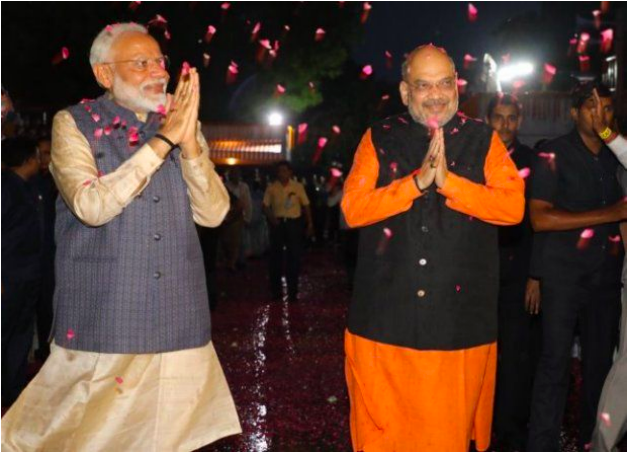Amid the overwhelming success of the BJP-led NDA, one question continues to confront us: Does democracy mean only the celebration of success? Or, does it also mean the acknowledgement of the presence of those who seem to have failed in the logic of numbers? If democracy – and particularly when the ruling regime’s victory becomes spectacular – loses the sensitivity to understand that even those who have failed, and have a different voice ought to be listened to, it would mean yet another form of authoritarianism, even though legitimized through mass democracy.
And hence, the true lovers of democracy must observe Mr. Narendra Modi and his team carefully. At this juncture, we like to raise two critical questions relating to the paradoxes of mass democracy. First, can the voices of sanity be always popular amongst the masses? Believe it, the logic of numbers alone cannot validate the language of sanity. Yes, to take a striking example, people have elected Pragya Singh Thakur, despite her not so ‘saintly’ behavior, and promotion of the kind of militant Hindu nationalism that gave birth to a man like Nathuram Godse. Does it then mean that she is the embodiment of truth, and all that Mohandas Karamchand Gandhi did in his life ought to be thrown into the dustbin of history?
Or, for that matter, if cricketers, Bollywood stars and television actresses, despite the poverty of conviction and socio-political imagination, win the elections, and a young dreamer like Kanhaiya Kumar loses, should we then think that whatever sells is necessarily good? It would be like saying that since more people like Honey Singh, he is necessarily a better singer than, say, Bhimsen Joshi. Or, as Pepsi sells more than lemon water, it is necessarily healthy and good! In fact, this is the potential danger of mass democracy – or politics marketized as a ‘brand’ or a ‘product’; it fails to distinguish the appeal of instinctive populism from the depths of truth.
The second question is whether those who have ‘failed’ should exist. At a time when the magical success of Mr. Modi is almost hypnotizing, and television anchors and commentators keep praising the narratives of ‘success’, it is easier to forget those who have failed. It is easier to condemn them, see all sorts of faults in them, and laugh at them. And to see everything good in whatever wins becomes the new normal. It is safe.
See its consequences. You may say that militarism or macho nationalism is good because it appeals to people, and fetches the votes. You may say that democracy is essentially about one man–‘heroic’, ‘charismatic’ and ‘energetic’; and he is the ultimate saviour as people vote because he is there; and hence all those who think somewhat differently must be sidelined, or condemned as the ‘enemies ‘ of the nation. Hence, the burden or arrogance of success might lead the ruling regime to further devalue, say, the questions that some ‘failed’ people raise about GST and demonetization, reduction of religion into a sword of hatred, valorization of violence, and decline of the institutions like CBI, RBI, Election Commission and even the judiciary.
‘I am the winner. My people have elected me. They identify with me. And hence I am always right.’ If a leader begins to think like this, democracy would be reduced into the might of majoritarianism. And hence, Mr. Modi, we must say, you are facing the enormous challenge.
Yes, he has succeeded. But then, let the glory of success–especially when the powerful media houses, instead of acting as keen observers with critical thinking, love to reduce themselves into mere advertising agencies for the ruling regime, or, for that matter, when the psychology of fear (an inevitable consequence of this sort of assertive power) tends to silence and demoralize those who think differently–not blind him. Let him talk to those who believe that there are limits to militaristic nationalism, or the economy is not really doing well, and the moral foundation of the nation would decline if universities are attacked, and critical/independent voices suppressed.
Democracy, believe it, is the art of humility. Democracy is the ability to listen to those who have a different voice. Democracy is the maturity to realize that the tyranny of ‘success’ is life-killing, and at times those who have ‘failed’ carry the lamp of truth. Don’t forget that there is divinity in ‘madness’. A Sufi saint knows what the emperor doesn’t.
Noakhali 1946, Gandhi was carrying the lamp of truth amid the violence all around. Well, today people have chosen the likes of Pragya Singh Thakur. But then, despite the mandate, she, unlike the lonely Gandhi walking with a frail body, does not carry the wisdom that a sane society ought to cultivate.
Are we capable of seeing this paradox?
Advertisement








